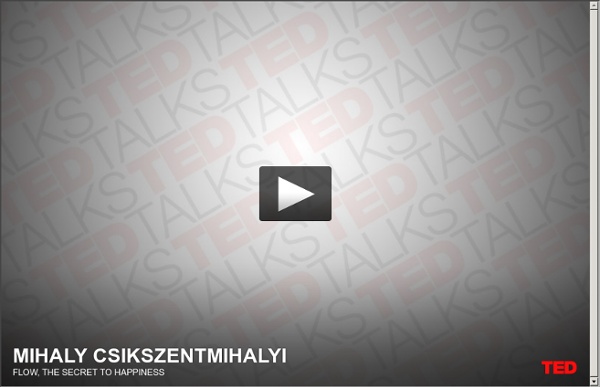



http://www.ted.com/talks/mihaly_csikszentmihalyi_on_flow.html
The 10 Best TED Talks of 2011 Watching videos online is usually considered fun, but generally a waste of time. Not so with TED videos, which are uniformly interesting, educational, inspiring, and enjoyable. If you haven't spent much time (or any) checking out TED videos, you should – and to help with that, I've compiled what seem to be the very best 10 TED videos of 2011. Flow theory This article or chapter is incomplete and its contents need further attention. Some information may be missing or may be wrong, spelling and grammar may have to be improved, use your judgment! 1 Definition Flow also called "Optimal experience" is a concept developed by Mihaly Csikszentmihalyi. "the holistic experience that people feel when they act with total involvement" (Csikszentmihalyi, 1975: 36) “… flow – the state in which people are so involved in an activity that nothing else seems to matter; the experience itself is so enjoyable that people will do it even at great cost, for the sheer sake of doing it.” (Csikzentmihalyi, 1991) "A sense of that one’s skills are adequate to cope with the challenges at hand in a goal directed, rule bound action system that provides clear clues as to how one is performing.
How Do We Know When Students Are Engaged? (Updated 11/2013) Educational author and former teacher, Dr. Michael Schmoker shares in his book, Results Now, a study that found of 1,500 classrooms visited, 85 percent of them had engaged less than 50 percent of the students. In other words, only 15 percent of the classrooms had more than half of the class at least paying attention to the lesson. So, how do they know if a student is engaged? Innovation – The Leadership Soft Skills A summary of the role of leadership and soft skills in innovation. ‘A leader is best when people barely know he exists, when his work is done, his aim fulfilled, they will say: we did it ourselves.’ - Lao Tzu There are a lot of blogs and worthy peer journals, sharing the importance of innovation in business success and survival. We all agree innovation is important, but how do
Some Body: How Yoga Taught Me To Finally Respect My Physical Self For the first time, I saw my body as something actual rather than as an abstraction. I realized it was just as important as my mind. It was my vessel, the only mode of transport I have. If I was going to make any sense at all of the small corner of reality that I’ve been given, I was going to have to use my body, and become as fully aware of its processes as possible. The Origins of Flow As a reader of MP, there's a decent chance that you're already familiar with the concept of "flow" championed by positive psychologist Mihaly Csikszentmihalyi (pronounced like this, not this). If you aren't up to speed on it, fear not; I'll go into the details in just a moment. The notion is immensely popular among game designers and theorists, whether they want to leverage games' power to put us into a flow state to pursue social good, are using psychophysiological tools to quantify flow and keep players in it, or simply using it as the blueprint for good game design. But as much as the games community wants to take flow as its own, there's more to the story. I finally sat down and read Csikszentmihalyi's principal book on the topic, and the truth of the matter is that "flow" is much more than a gaming concept. The key realization, and the one Csikszentmihalyi is famous for, is that there's a sweet spot where challenge and skill are well-matched that he dubbed the "flow channel".
Picasso, Kepler, and the Benefits of Being an Expert Generalist One thing that separates the great innovators from everyone else is that they seem to know a lot about a wide variety of topics. They are expert generalists. Their wide knowledge base supports their creativity. Are all new things a mash-up of what came before? A Q&A with Kirby Ferguson In today’s TEDTalk, director Kirby Ferguson outlines a bold vision of creativity — that it’s not about dreaming up a new song, a new piece of art or a new form of technology in a vacuum, but instead about remixing what has come before. In his fast-paced talk, Kirby reveals that many of our most iconic thinkers — from Henry Ford to Bob Dylan — embraced this idea of what it means to create. As we watched Kirby’s talk, a slew of questions popped to mind. What does this mean for creative people? Can we reach a point where ideas become too self-referential?
Une vidéo très intéressante sur le thème du "flow" ou flux en français, qui consiste à atteindre un état mental maximal de concentration, dans lequel on vit le présent pleinement, ce qui permet de d'être plus heureux. by pauline_groupe1_psy Mar 17
Flow the psychology of optimal experience by nicktalop Dec 11